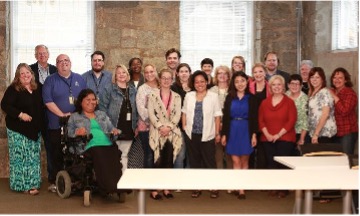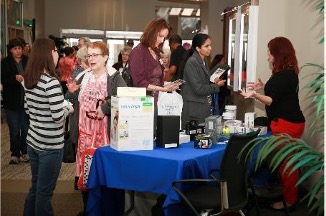
ACCESS for Aging Well
ACCESS for Aging Well
Goals for ACCESS Aging Well
To improve the provision of community living assistive technology (AT) & accommodations that increase independence and facilitate aging-in-place, by developing ACCESS for Aging Well, a tool that service providers can use to make informed, evidence-based decisions.
Introduction to ACCESS for Aging Well
The Georgia Institute of Technology’s (Georgia Tech) Center for Inclusive Design and Innovation (CIDI), in collaboration with the University of Washington’s Center for Technology & Disability Studies (CTDS), is developing ACCESS for Aging Well, a dynamic assistive technology (AT) and accommodation system with web-based and mobile functionality that will help older adults with disabilities and their formal and informal caregivers and service providers work together to identify AT & accommodations that assist older adults with disabilities to continue to live in their community of choice. ACCESS for Aging Well uses intelligent algorithms to prioritize recommendations within a person-centered service framework. These algorithms are based on existing data from project partners, collected data from use of the system, and review of state-of-the-science evidence in the scientific literature and practitioner input. This project will build upon several current proof of concept development projects at CIDI and continue through the Proof of Product and Proof of Adoption stages of development. The project addresses NIDILRR’s domain on Community Living and Participation, as well as its cross-cutting priority Technology for Access and Function, through development activities that contribute to improved community living and participation outcomes for older adults with disabilities.

When age-related functional declines occur among people with disabilities (aging with a disability) or among older adults as part of the aging process (aging into a disability), they often turn to service providers for help with AT & accommodation recommendations. Unfortunately, while rehabilitation services providers may be familiar with AT & accommodations overall, they may lack information about the unique needs of older adults. In contrast, providers of senior services lack guidance on AT & accommodations for people with impairments acquired in early or mid-life. Although there are a variety of tools to help service providers assess needs and recommend accommodations for older adults or adults with disabilities, there is a lack of tools that address the needs of older adults with disabilities. Moreover, there are no existing tools to assist providers and empower clients to make decisions collaboratively that best meet clients’ needs.
ACCESS for Aging Well is addressing these needs by creating an online AT & accommodation assessment system that service providers can use while conducting community living evaluations with older adults, their families and circles of support. ACCESS for Aging Well incorporates the International Classification of Function (ICF) as well as considering all person, environment, and contextual factors in making recommendations, and it will prioritize suggestions based on information about accommodation effectiveness. ACCESS for Aging Well assists them work together to make informed choices about the most appropriate assistive technologies, strategies, inclusively designed features of mainstream technologies and environments, and community services. ACCESS for Aging Well will address all three phases of assessment: Investigation, Interpretation, and Intervention.

ACCESS for Aging Well’s Specific aims are to:
- Develop validated decision algorithms that contain an assessment protocol to collect personal, task and environmental information; and develop complementary rule sets that present potential solutions;
- Prioritize and refine the decision algorithms through evidence gained from published research, predictive analytics of historical data in the Georgia DAS and Washington ALTSA client management systems, and system users’ feedback on accommodation effectiveness;
- Incorporate links to new and existing resource materials that provide additional information about the accommodations and assist with their implementation;
- Develop a web interface to the system, a web-enabled mobile app, and an application programming interface (API) that links the tool with the DAS and ALTSA client management systems;
- Optimize the expert system’s interface for usability and accessibility;
- Conduct preliminary field tests to compare the problems / AT & accommodations identified by the system to those identified by an expert in the field and between users;
- Update the system and release it to the public for beta-testing;
- Obtain feedback from users about the ACCESS for Aging Well site’s design and its utilization, and make necessary refinements based on field testing; and
- Disseminate the ACCESS for Aging Well system and the research findings through aging and rehabilitation services provider networks.
To ensure that older adults with disabilities, their support systems, and providers of aging and rehabilitation services are engaged throughout development of the tool, we will not only collaborate with DAS and ALTSA, but also with the Assistive Technology Act Technical Assistance and Training (AT3) Center (part of the Association of Assistive Technology Act Programs (ATAP)), LeadingAge, and the Association of Programs for Rural Independent Living (APRIL), in the design and evaluation of the accommodation tool.

Project outputs will include the ACCESS for Aging Well system and new findings on community living accommodation effectiveness for older adults. It is anticipated that the expert system will result in more informed decisions about community living AT & accommodations that better meet the needs of individuals aging with or into a disability. These outcomes, in the long term, should lead to greater independence and continued community living and participation.
Phillips, C. (2020, October). Assisting Adults with Learning Disabilities in Assistive Technology Decisions. Presentation on Learning Disabilities of America (LDA) Webinar Series.
Phillips, C. (2021, March). Trends in Assistive Technology Research Transitions. Presentation for Georgia Assistive Technology in Education (GATE) Conference. Atlanta, GA.
Phillips, C. (2021, March). Building Bridges for Successful Transitions. Keynote for 27th Annual Guam Systems for Assistive Technology Conference. University of Guam. Television Broadcast.